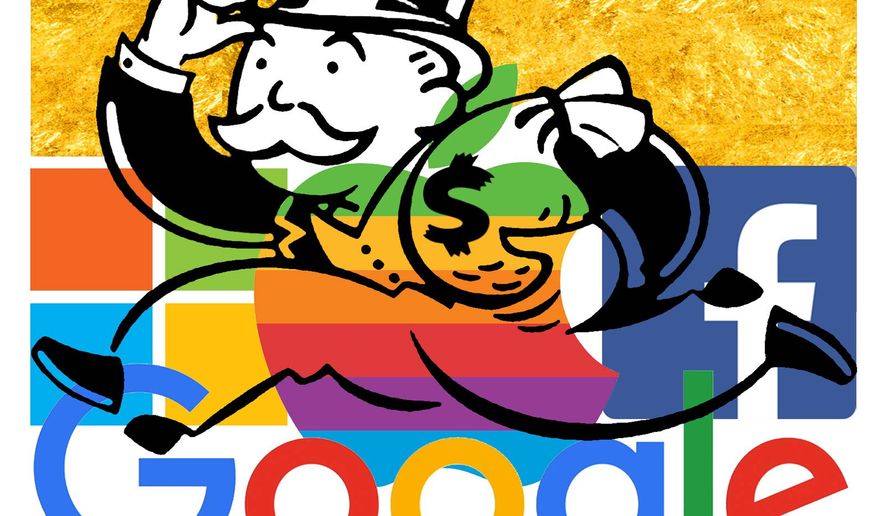OPINION:
When left and right finally agree on something, watch out: The unthinkable becomes normal.
So it is with changing attitudes toward Silicon Valley.
For the last two decades, Apple, Google, Amazon and other West Coast tech corporations have been untouchable icons. They piled up astronomical profits while hypnotizing both left-wing and right-wing politicians.
Conservative administrations praised them as modern versions of 19th-century risk-takers such as Andrew Carnegie and John D. Rockefeller. Bill Gates, the late Steve Jobs and other tech giants were seen as supposedly creating national wealth in an unregulated, laissez-faire landscape that they had invented from nothing.
At a time when American companies were increasingly unable to compete in the rough-and-tumble world arena, Apple, Microsoft and Facebook bulldozed their international competition. Indeed, they turned high-tech and social media into American brands.
The left was even more enthralled. It dropped its customary regulatory zeal, despite Silicon Valley’s monopolizing, outsourcing, offshoring, censoring and destroying of startup competition. After all, Big Tech was left-wing and generous. High-tech interests gave hundreds of millions of dollars to left-wing candidates, think tanks and causes.
Companies such as Facebook and Google were able to warp their own social media protocols and internet searches to insidiously favor progressive agendas and messaging.
If the left feared that the tech billionaires were becoming robber barons, they also delighted in the fact that they were at least left-wing robber barons.
Unlike the steel, oil and coal monopolies of the 19th century that out of grime and smoke created the sinews of a growing America, Silicon Valley gave us shiny, clean, green and fun pods, pads and phones.
As a result, social media, internet searches, texts, email and other computer communications were exempt from interstate regulatory oversight. Big Tech certainly was not subject to the rules that governed railroads, power companies, trucking industries, Wall Street, and television and radio.
But attitudes about hip high-tech corporations have now changed on both the left and right.
Liberals are under pressure from their progressive base to make Silicon Valley hire more minorities and women.
Progressives wonder why West Coast techies cannot unionize and sit down for tough bargaining with their progressive billionaire bosses.
Local community groups resent the tech giants driving up housing prices and zoning out the poor from cities such as Seattle and San Francisco.
Behind the veneer of a cool Apple logo or multicolored Google trademark are scores of multimillionaires who live one-percenter lifestyles quite at odds with the soft socialism espoused by their corporate megaphones.
Conservatives got sick of Silicon Valley, too.
Instead of acting like laissez-faire capitalists, the entrenched captains of high-tech industry seem more like government colluders and manipulators. Regarding the high-tech leaders’ efforts to rig their industries and strangle dissent, think of conniving Jay Gould or Jim Fisk rather than the wizard Thomas Edison.
With the election of populist Donald Trump, the Republican Party seems less wedded to the doctrines of economic libertarian Milton Friedman and more to the trust-busting zeal of Teddy Roosevelt.
The public so far has welcomed the unregulated freedom of Silicon Valley — as long as it was truly free. But now computer users are discovering that social media and web searches seem highly controlled and manipulated — by the whims of billionaires rather than federal regulators.
The public faces put on by West Coast tech leaders have not helped.
For years, high-tech grandees dressed all in hip black while prancing around the stage, enthralling stockholders as if they were rock stars performing with wireless mics. Some wore jeans, sneakers and T-shirts, making it seem like being worth $50 billion was hipster cool.
But the billionaire-as-everyman shtick has lost his groove, especially when such zillionaires lavish their pet political candidates with huge donations, seed lobbying groups and demand regulatory loopholes.
Ten years ago, a carefree Mark Zuckerberg seemed cool. Now, his T-shirt get-up seems phony and incongruous with his walled estates and unregulated profiteering.
Of course, Silicon Valley’s critics should be wary. They wonder whether the golden tech goose can be caged without being killed.
Both liberals and conservatives are just beginning to ask why internet communications cannot be subject to the same rules applied to radio and television.
Why can’t Silicon Valley monopolies be busted up in the same manner as the Bell Telephone octopus or the old Standard Oil trust?
Why are high-tech profits hidden in offshore accounts?
Why is production outsourced to impoverished countries, sometimes in workplaces that are deplorable and cruel?
Why does texting while driving not earn a product liability suit?
Just because Silicon Valley is cool does not mean it could never become just another monopoly that got too greedy and turned off the left wing, the right wing and everybody in between.
• Victor Davis Hanson is a classicist and historian with the Hoover Institution at Stanford University.




Please read our comment policy before commenting.